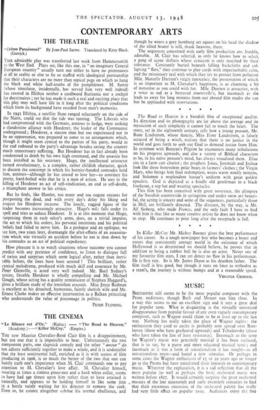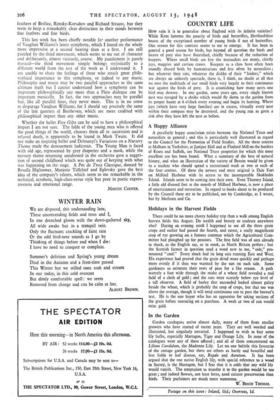MUSIC
BEETHOVEN still seems to be the most popular composer with the Prom, audiences, though Bach and Mozart run him close. In a way this seems to me an excellent sign and it says a great deal for popular taste. What is disquieting is the virtually unnoticed disappearance from popular favour of any even vaguely contemporary composer, such as Wagner could claim to be at least up to the last war. Nothing has really taken the place of Wagner nights : the enthusiasm they used to excite is probably now spread over Beet- hoven (those who have graduated upwards) and Tchaikovsky (those who have taken the line of least resistance). Inasmuch as the taste for Wagner's music was genuinely musical it has been replaced, that is to say, by a purer and more educated musical taste ; and inasmuch as it was a form of sensationalism it has sought—as all sensationalism must—and found a new stimulus. Or perhaps in some cases the Wagner enthusiasts of 15 or 20 years ago no longer go to the Proms but have transferred their interests to contemporary music. Whatever the explanation, it is a sad reflection that all the most popular (as well as perhaps the best) orchestral music was written before 1827. It would certainly surprise the great orchestral ,masters of the late nineteenth and early twentieth centuries to find that their enormous extension of the orchestral palette has really had very little effect on popular taste. Audiences enjoy the fine
feathers of Berlioz, Rimsky-Korsakov and Richard Strauss, but they seem to keep a remarkably clear distinction in their minds between fine feathers and fine birds.
This last week has been chiefly notable fo-.. another performance of Vaughan Williams's latest symphony, which I found on the whole more impressive at a second hearing than at a first. I am still puzzled by the third movement, which seems to me out of character and deliberately, almost viciously, coarse. My puzzlement is purely musical—the third movement simply belongs stylistically to a different world from the rest of the work as I understand it. I am unable to share the feelings of those who attach great philo- sophical importance to this symphony, or indeed to any music. Philosophy and music may be two parallel approaches to the same ultimate truth but I cannot understand how a symphony can be important philosophically any more than a Plato dialogue can be important musically. In fact, the two approaches may be parallel but, like all parallel lines, they never meet. This is in no sense to disparage Vaughan Williams, for I should say precisely the same of the late quartets of Beethoven which are more credited with philosophical import than any other music.
Whether the ballet Five Gifts can be said to have a philosophical import I am not sure. The fable of the young man who is offered the good things of the world, chooses them all in succession and is refused death, is apparently to be found in Mark Twain. It did not make an inspiring ballet and Dohnanyi's Variations on a Nursery Theme made the denouement ludicrous. The Young Man is faced with old age, represented by grey draperies and a mask, while the nursery theme returning unadorned in the orchestra gave a sugges- tion of second childhood which was quite out of keeping with what was happening on the stage. A Pus de Trois Classique, danced by Rosella Hightower, Marjorie Tallchief and Eglevsky gave the best idea of the company's talents, which seem to me remarkable in the technical, acrobatic, high-class-revue style but poor in poetic expres- siveness and emotional range.
MARTIN COOPER.



































 Previous page
Previous page